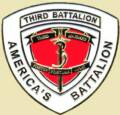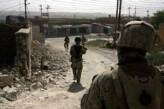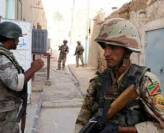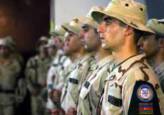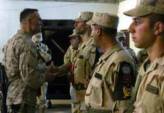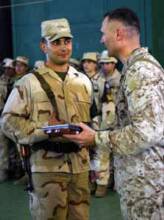

Note: This is not an official website. It's purpose is to support Marines of 3/3.

Marines in Haditha 'Triad' continue work with Iraqi soldiers, quell insurgency
Submitted by: 1st Marine Division
Story by: Sgt. Roe F. Seigle
HAQLANIYAH, Iraq(July 22, 2006) -- Marines here say the amount of insurgent attacks against Coalition and Iraqi military forces have drastically decreased since three Marines eliminated two insurgents in a counterattack in front of the forward operating base here last month.
Marines assigned to the Hawaii-based Kilo Company, 3rd Battalion, 3rd Marine Regiment said the outcome of the counterattack sent a message to the insurgents: they will be outgunned and overpowered in a firefight with Marines and Iraqi soldiers.
Marines have spent the past four months patrolling the dusty streets of Haqlaniyah – a city of 30,000 just south of Haditha in western Al Anbar Province – to disrupt insurgent activity and provide security for the city’s residents.
In the past few weeks, Iraqi soldiers – who are partnered with 3rd Battalion – began spearheading daily patrols throughout the city, which Marines say was once a breeding ground for the insurgency.
Just six weeks ago, Marines led the patrols, outnumbering their Iraqi counterparts each time they stepped “outside the wire.” Now, the Iraqis outnumber the Marines, and make all tactical decisions during each mission – a stark contrast from when the Marines arrived in Iraq four months ago.
“The progress the soldiers are making is outstanding because they have done it in such a short amount of time,” said 1st Sgt. Vincent Santiago, 35, Kilo Company’s senior enlisted advisor. “The insurgents are noticing the progress the soldiers are making and I believe it is scaring them (insurgents) because there have been very few attacks in the last month.”
Moreover, the frequency of Iraqi soldier-led patrols in this city nestled along the Euphrates River has increased two-fold in recent months.
By year’s end, the soldiers will be able to lead patrols without the assistance of the Marines, said Sgt. Mennen Suleiman, non-commissioned officer in charge of Kilo Company’s Military Transition Team – groups of U.S. service members responsible for mentoring and assisting Iraqi Security Forces towards independent operations.
“The soldiers are in the front of patrols and are moving through the city with a sense of confidence,” said Suleiman, 26, a native of Kearney, Neb. “They are making the decisions during the patrols and are not looking back at the Marines for that nod of approval like they used to.”
Currently, soldiers here are operating at the squad and platoon levels with little to no assistance from Coalition Forces. Still, more challenges lie ahead, and more training is required, before Iraqi military units here can operate fully independently.
Once the soldiers demonstrate they can operate as a company, they will quickly learn how to conduct operations at the battalion, brigade and division levels, said Suleiman.
Suleiman spends most of his days refreshing the soldiers’ basic military skills, such as map reading, entry into enemy-held establishments, marksmanship and proper reporting methods. The soldiers are then teaching the skills to the new soldiers who arrive in the company.
As the soldiers continue to demonstrate their abilities to lead patrols and operate independently, the number of Marines accompanying soldiers on missions is continually decreasing, said Suleiman, who is fluent in Arabic and was born in Kirkut, Iraq.
“The Marines are great teachers and are very patient with us,” said one Iraqi soldier assigned to 2nd Battalion, 2nd Brigade, 7th Iraqi Army Division – the Iraqi battalion partnered with 3rd Bn., 3rd Marines. “We are getting more and more confident everyday and soon we will not need the Marines at all when we go on patrols.”
However, Suleiman said the soldiers need more equipment such as humvees and radios to be more effective on patrols.
“It is easy to teach the soldiers because they are eager to learn and want to be in charge out there on the streets,” said Suleiman, following a three-hour combined U.S.-Iraqi patrol. “They have bonded with the Marines and take everything we have taught them to heart. The more they learn, the closer we come to bringing troops home.”
However, though attacks against U.S. and Iraqi forces have decreased recently, there are still occasional random attacks against U.S. and Iraqi troops in the city.
Last week, a Marine was standing post near the U.S. forward operating base here when he was shot at by insurgents. The following week an improvised explosive device, roadside bombs placed by insurgents along Iraq’s roadways, detonated beside a humvee.
Now more than half-way into their seven-month deployment, Kilo Company’s Marines have not lost their focus on their mission at hand, said Santiago.
The Marines are patrolling the city night and day and are being very flexible with the fast-paced operations, he said.
Third Battalion is scheduled to return to the United States later this year. They’ll be replaced by another Hawaii-based U.S. military unit.
--------------------------------------------------------------------------------
Iraqi soldiers head outside the Marines’ forward operating base in Haqlaniyah, Iraq, July 13, 2006 to patrol the city. Marines here say the amount of insurgent attacks against Coalition and Iraqi military forces have drastically decreased since three Marines eliminated two insurgents in a counterattack in front of the forward operating base here last month. In the last few weeks, Iraqi soldiers – who are partnered with 3rd Battalion – began spearheading daily patrols throughout the city, which Marines say was once a breeding ground for the insurgency. Just six weeks ago, Marines led the patrols, outnumbering their Iraqi counterparts each time they stepped “outside the wire.” Now, the Iraqis outnumber the Marines, and make all tactical decisions during each mission – a stark contrast from when the Marines arrived in Iraq four months ago. Photo by: Sgt. Roe F. Seigle
--------------------------------------------------------------------------------
Sgt. Benjamin Snyder, a squad leader assigned to the Hawaii-based Kilo Company, 3rd Battalion, 3rd Marine Regiment peeks around a corner during a four-hour patrol in the streets of Haqlaniyah, Iraq July 13, 2006. Marines here say the amount of insurgent attacks against Coalition and Iraqi military forces have drastically decreased since three Marines eliminated two insurgents in a counterattack in front of the forward operating base here last month. In the last few weeks, Iraqi soldiers – who are partnered with 3rd Battalion – began spearheading daily patrols throughout the city, which Marines say was once a breeding ground for the insurgency. Just six weeks ago, Marines led the patrols, outnumbering their Iraqi counterparts each time they stepped “outside the wire.” Now, the Iraqis outnumber the Marines, and make all tactical decisions during each mission – a stark contrast from when the Marines arrived in Iraq four months ago. Photo by: Sgt. Roe F. Seigle
--------------------------------------------------------------------------------
An Iraqi soldier leads a patrol through the streets of Haqlaniyah, Iraq, July 13, 2006. Marines here say the amount of insurgent attacks against Coalition and Iraqi military forces have drastically decreased since three Marines eliminated two insurgents in a counterattack in front of the forward operating base here last month. In the last few weeks, Iraqi soldiers – who are partnered with 3rd Battalion – began spearheading daily patrols throughout the city, which Marines say was once a breeding ground for the insurgency. Just six weeks ago, Marines led the patrols, outnumbering their Iraqi counterparts each time they stepped “outside the wire.” Now, the Iraqis outnumber the Marines, and make all tactical decisions during each mission – a stark contrast from when the Marines arrived in Iraq four months ago Photo by: Sgt. Roe F. Seigle
_______________________________________________
Marines bid adieu to protectors of Haditha Dam
July 13, 2006; Submitted on: 07/22/2006 04:41:25 AM
By Sgt. Roe F. Seigle, Regimental Combat Team7
HADITHA, Iraq (July 13, 2006) -- Marines operating in the Haditha-triad region recently bid farewell to Azerbaijani soldiers who have spent the past six months providing internal security for hundreds of Marines headquartered at the city’s large dam.
A change of command ceremony here July 13, 2006, marked the end of a six-month tour of duty in Iraq for one group of the soldiers and the beginning for another.
Azerbaijan is a former Soviet Union state located in southwestern Asia bordering the Caspian Sea between Iran and Russia and is slightly smaller than Maine.
The dam is occupied by the Hawaii-based 3rd Battalion, 3rd Marine Regiment, who have spent the past four months combating insurgents and training Iraqi soldiers and police.
The soldiers support the Marines by providing perimeter security around the dam, escorting Iraqi workers and protecting the battalion’s command and control center.
By performing these duties, they free up a whole “company’s worth” of Marines, who in turn can support operations against anti-Iraqi forces throughout the region, said 1st Lt. Sam Monte, the 29-year-old executive officer of the battalion’s Headquarters and Service Company.
“Each soldier volunteered to come to Iraq and they are very eager to work with the Marines,” said Azerbaijan Army Capt. Javid Abbasov, the executive officer assigned to 1st Company, Guard Force Brigade. “They are glad to be able to represent their country and will do the mission to the best of their ability.”
All young males in Azerbaijan are obligated to serve in the armed forces for a year and a half. However, if the soldiers volunteer to serve in a combat zone, they are only required to serve one year.
The soldiers have had a presence in the Haditha Dam and supported Coalition Forces for more than three years, said Monte, a native of Portland, Ore.
“The soldiers have been very professional at all times,” said Monte. “Even though there was a language barrier many of the Marines made friends with them and they both learned phrases in each others’ languages.”
The soldiers occupy separate sections of the dam’s living space, but dine with the Marines everyday and often watch movies together after evening meals.
With less than a week at their new posts at the dam, the new batch of soldiers are learning their jobs and routines in the dam quickly and thoroughly, said Monte.
Abbasov, who has previously served in Iraq, said serving with Coalition Forces is a bit of an honor for Azerbaijan’s soldiers – the soldiers are hand selected by their commanders, and only top-notch soldiers make the cut.
“It is a great experience for me and the other soldiers to contribute in the Global War on Terrorism and our government supports our mission here as well,” said Abbasov. “I am personally thankful to be here and help Iraq rebuild their country and I know all my soldiers feel that way as well.”
Third battalion, also known as “America’s Battalion,” arrived in March and is scheduled to depart Iraq this fall. They will be replaced by another Hawaii-based unit U.S. military unit.
--------------------------------------------------------------------------------
Azerbaijani soldiers, who provide internal security at the dam in Haditha, Iraq, stand in military formation during a change of command ceremony for the outgoing and incoming Azerbaijan Army units at the dam – headquarters for the Hawaii-based 3rd Battalion, 3rd Marine Regiment – July 13, 2006. The ceremony marked the end of a six-month tour of duty for one group of soldiers and the beginning for another. Azerbaijan is a former Soviet Union state located in Southwestern Asia bordering the Caspian Sea between Iran and Russia and is slightly smaller than the state of Maine. The soldiers supported the Marines by providing perimeter security around the dam, escorting Iraqi workers and protecting the command and control center for the battalion. By performing these duties, the soldiers “free up a whole company’s worth” of Marines, who in turn can support operations against anti-Iraqi forces throughout the region, said 1st Lt. Sam Monte, the 29-year-old executive officer of the battalion’s Headquarters and Service Company. The Hawaii-based Marine battalion, also known as “America’s Battalion,” arrived in March and is scheduled to depart Iraq this fall. They will be replaced by another Hawaii based unit. Photo by: Cpl. Bryan M. Henner
--------------------------------------------------------------------------------
Lt. Col. Norman L. Cooling, 38, commanding officer of the 3rd Battalion, 3rd Marine Regiment, bids farewell to an Azerbaijani soldier during a change of command ceremony July 13, 2006, at the battalion’s headquarters at Haditha Dam in Iraq’s Al Anbar Province. The ceremony marked the end of duty in Iraq for one group of Azerbaijani soldiers, who were relieved by another group of Azerbaijani soldiers. The soldiers are hand-selected by their commanders to serve in Iraq alongside Coalition Forces. The outgoing Azerbaijani soldiers spent six months providing internal security at the dam. Azerbaijan is a former Soviet Union state located in Southwestern Asia bordering the Caspian Sea between Iran and Russia and is slightly smaller than the state of Maine. The soldiers supported the Marines by providing perimeter security around the dam, escorting Iraqi workers and protecting the command and control center for the battalion. By performing these duties, the soldiers “free up a whole company’s worth” of Marines, who in turn can support operations against anti-Iraqi forces throughout the region, said 1st Lt. Sam Monte, the 29-year-old executive officer of the battalion’s Headquarters and Service Company. The Hawaii-based Marine battalion, also known as “America’s Battalion,” arrived in March and is scheduled to depart Iraq this fall. They will be replaced by another Hawaii based unit. Photo by: Cpl. Bryan M. Henner
--------------------------------------------------------------------------------
Lt. Col. Norman L. Cooling, 38, commanding officer of the 3rd Battalion, 3rd Marine Regiment, bids farewell to an Azerbaijani soldier during a change of command ceremony July 13, 2006, at the battalion’s headquarters at Haditha Dam in Iraq’s Al Anbar Province. The ceremony marked the end of duty in Iraq for one group of Azerbaijani soldiers, who were relieved by another group of Azerbaijani soldiers. The soldiers are hand-selected by their commanders to serve in Iraq alongside Coalition Forces. The outgoing Azerbaijani soldiers spent six months providing internal security at the dam. Azerbaijan is a former Soviet Union state located in Southwestern Asia bordering the Caspian Sea between Iran and Russia and is slightly smaller than the state of Maine. The soldiers supported the Marines by providing perimeter security around the dam, escorting Iraqi workers and protecting the command and control center for the battalion. By performing these duties, the soldiers “free up a whole company’s worth” of Marines, who in turn can support operations against anti-Iraqi forces throughout the region, said 1st Lt. Sam Monte, the 29-year-old executive officer of the battalion’s Headquarters and Service Company. The Hawaii-based Marine battalion, also known as “America’s Battalion,” arrived in March and is scheduled to depart Iraq this fall. They will be replaced by another Hawaii based unit. Photo by: Cpl. Bryan M. Henner
Source: Marine Corps News
